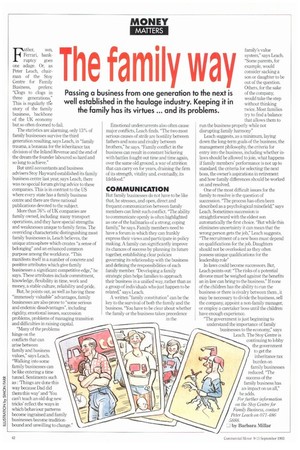The family wa
Page 46

If you've noticed an error in this article please click here to report it so we can fix it.
Passing a business from one generation to the next is well established in the haulage industry. Keeping it in the family has its virtues ... and its problems.
Father,
Ferrari, bank ruptcy goes one adage. Or, as Peter Leach, chairman of the Stoy Centre for Family Business, prefers: "Clogs to clogs in three generations" This is regularly the story of the family business, backbone of the UK economy but so often doomed to fail.
The statistics are alarming, only 13% of family businesses survive the third generation resulting, says Leach, in "family trauma, a bonanza for the inheritance tax division of the Inland Revenue and the end of the dream the founder laboured so hard and so long to achieve," But until accountants and business advisers Stoy Hayward established its family business centre last year, says Leach, there was no special forum giving advice to these companies. This is in contrast to the US where every state has a family business centre and there are three national publications devoted to the subject.
More than 76% of UK companies are family owned, including many transport operations, and they have special strengths and weaknesses unique to family firms. The overriding characteristic distinguishing most family businesses is, Leach believes, the unique atmosphere which creates "a sense of belonging" and an enhanced common purpose among the workforce. "This manifests itself in a number of concrete and positive attributes which give family businesses a significant competitive edge," he says. These attributes include commitment, knowledge, flexibility in time, work and money, a stable culture, reliability and pride.
But, he points out, as well as having these "immensely valuable" advantages, family businesses are also prone to "some serious and endemic disadvantages", including rigidity, emotional issues, succession problems, problems of managing transition and difficulties in raising capital.
"Many of the problems hinge on the conflicts that can arise between family and business values," says Leach. "Walking into some family businesses can be like entering a time tunnel, Sentiments such as : 'Things are done this way because Dad did them this way' and 'You can't teach an old dog new tricks' reflect the ways in which behaviour patterns become ingrained and family businesses become traditionbound and unwilling to change. Emotional undercurrents also often cause major conflicts, Leach finds. "The two most serious causes of strife are hostility between fathers and sons and rivalry between brothers," he says. "Family conflict in the business can result in constant bickering with battles fought out time and time again, over the same old ground, a war of attrition that can carry on for years, draining the firm of its strength, vitality and, eventually, its lifeblood."
COMMUNICATION
But family businesses do not have to be like that, he stresses, and open, direct and frequent communication between family members can limit such conflict. "The ability to communicate openly is often highlighted as one of the hallmarks of a strong, coping family," he says. Family members need to have a forum in which they can frankly express their views and participate in policy making. A family can significantly improve its chances of success by planning its future together, establishing clear policies governing its relationship with the business and defining the responsibilities of each family member. "Developing a family strategic plan helps families to approach their business in a unified way, rather than as a group of individuals who just happen to he related," says Leach.
A written "family constitution" can be the key to the survival of both the family and the business. "You have to be clear about whether the family or the business takes precedence family's value system," says Leach. "Some parents, for example, would consider sacking a son or daughter to be out of the question. Others, for the sake of the company, would take the step without thinking twice. Most families try to find a balance that allows them to run the business properly while not disrupting family harmony" Leach suggests, as a minimum, laying down the long-term goals of the business, the management philosophy, the criteria for entry into the business, including whether inlaws should be allowed to join, what happens if family members' performance is not up to standard, the criteria for selecting the next boss, the owner's aspirations in retirement and how family differences should be worked on and resolved.
One of the most difficult issues for the family to resolve is the question of succession. "The process has often been described as a psychological minefield," says Leach. Sometimes succession is straightforward with the eldest son automatically the first choice. "But while this eliminates uncertainty it can mean that the wrong person gets the job," Leach suggests. "The recruitment of a new boss must depend on qualifications for the job. Daughters should not be overlooked as they often possess unique qualifications for the leadership role" In-laws could become successors. But, Leach points out "The risks of a potential divorce must be weighed against the benefits an in-law can bring to the business." if none of the children has the ability to run the business or there is rivalry between them, it may be necessary to divide the business, sell the company, appoint a non-family manager, or employ a caretaker boss until the children have enough experience.
"The government is just beginning to understand the importance of family businesses to the economy," says Leach. The Stoy Centre is continuing to lobby the government to get the inheritance tax burden on family businesses reduced. "The success of the family business has an impact on us all," he adds.
For further information on the Stoy Centre for Family Business, contact Peter Leach on 071-486 5888.


























































































